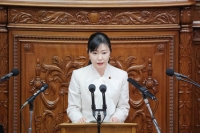Japan on Thursday disclosed more details of the planned fees that will be added to public medical insurance premiums to help secure funds to fight the country's low birthrate.
Participants in the kokumin kenkо̄ hoken public medical insurance program for self-employed people and others are expected to pay ¥800 ($5) a month if they have an annual income of ¥6 million as of fiscal 2028, said Ayuko Kato, minister for children-related policies.
The expected monthly fee stands at ¥550 for those with an annual income of ¥4 million and ¥1,100 for those with an annual income of ¥8 million, Kato told a special committee meeting at the House of Representatives, the lower chamber of parliament.
There will be a relief measure for low-income households, under which a participant with an annual income of ¥2 million will be charged ¥250 per month, Kato added.
The estimates only serve as reference figures, Kato said, adding that many participants in the program receive less than ¥4 million in annual income.
On Tuesday, the government released similar estimates of fees by annual income for corporate workers. For instance, an employee with an annual income of ¥6 million is expected to pay ¥1,000 monthly.
Japan will start to collect the fees in fiscal 2026 from participants in kokumin kenkо̄ hoken and other public medical insurance programs, boosting the amounts in stages in order to collect a total of ¥1 trillion annually.
The government plans to secure ¥3.6 trillion annually by fiscal 2028 for measures to address the low birthrate. Of the total, ¥1 trillion would come from the fees.
At Thursday's meeting, Takeshi Shina of the main opposition Constitutional Democratic Party of Japan criticized the government, saying it "should consider ways to secure funds without asking (the public) to pay fresh costs."



















With your current subscription plan you can comment on stories. However, before writing your first comment, please create a display name in the Profile section of your subscriber account page.